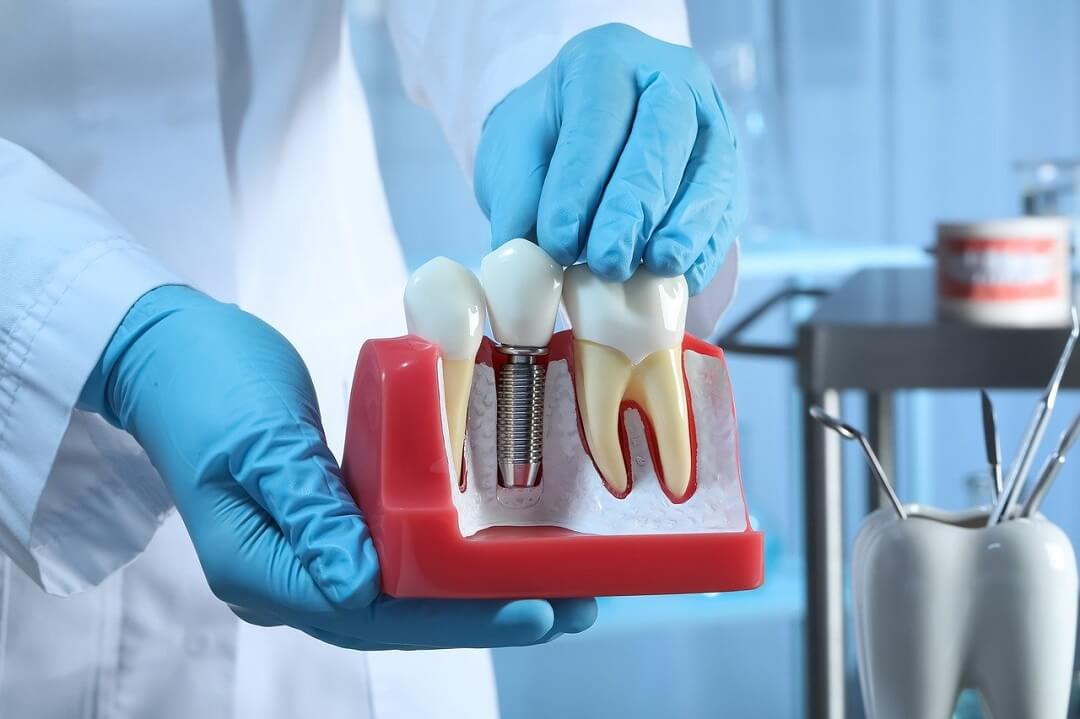Dental implants are widely regarded as a safe and long-lasting solution for missing teeth. With countless people around the world smiling more confidently because of them, there’s a reason they’ve become a gold standard in tooth replacement.
In this article, you’ll learn the simple facts about dental implants. We’ll talk about how safe they are, how long they can last, and why so many folks pick them.
Have you ever felt too shy to smile because of a missing tooth or had trouble with fake teeth that just don’t feel right?
We get it. It can be tough. But there’s good news: today’s dental fixes are better than ever. We’ve compiled all the necessary info to help you figure things out. And, hopefully, get you back to smiling wide and proud.
Key Takeaways
- Dental implants are durable solutions for missing teeth, made from materials like titanium that bond with our jawbones.
- They boast a high success rate of over 95%, with minimal risks when done by experienced professionals.
- Proper care and maintenance can make dental implants last for many decades; regular cleaning and dentist check-ups are essential.
- While titanium is commonly used because of its strength and compatibility, zirconia offers a metal-free, tooth-colored alternative.
- If any prolonged discomfort, swelling, or movement is noticed post-implant, it’s important to consult a dentist promptly for assessment.
What are dental implants?
Dental implants, a popular solution for missing teeth, have been widely used in dentistry for over fifty years. They offer a durable and permanent alternative to bridges or dentures by replacing the root of the tooth with an artificial one made from titanium or other biocompatible materials.
Components of Dental Implants
A dental implant is typically composed of three parts:
-
- The Implant: This is essentially a screw that serves as a root for your new teeth. It’s permanently attached to your jawbone.
- The Abutment: A permanent but removable connector that supports and holds either single or multiple replacement teeth (crown).
- The Crown (or prosthetic tooth): This part looks like your natural tooth which is usually made of zirconium or porcelain for durability and good looks.
Why Choose Dental Implants?
-
- Look Natural: One of the biggest reasons folks go for dental implants is because they look so real. Once they’re in, it’s tough to tell them apart from your natural teeth.
- Feel Like Real Teeth: Unlike some other fake teeth, dental implants don’t move or slip. You can eat, talk, and laugh without worrying about them.
- Good for Jaw Health: Over time, missing teeth can cause the jawbone to get weak. Dental implants help strengthen the bone because they act like natural tooth roots.
In short, dental implants give back a natural-looking smile, keep things in place when you eat or chat, and help your jaw stay healthy.
Understanding the Safety of Dental Implants
Dental implants have a history rooted in years of successful use. With an impressive success rate above 95%, they’re proven to be one of the most reliable solutions for missing teeth.
Their safety is often questioned because it involves minor surgery. But like removing your wisdom teeth, it’s common and typically straightforward with minimal risks when performed by trained professionals.
Risks associated with dental implants are rare but can include infection, nerve damage, or implant failure. However, these complications occur in less than 5% of cases, according to the American Association of Oral and Maxillofacial Surgeons’ report.
Patient Screening & Evaluation: A Key Step Towards Safety
Prior to any procedure, comprehensive patient evaluation ensures that only suitable candidates get dental implants. Factors considered include general health conditions, oral hygiene habits, and bone density at the site where the implant will be placed.
Safety through Quality Materials
The materials used in dental implants also contribute greatly towards their safety profile – titanium is most commonly used due to its strength and compatibility with human body tissues.
Maintaining Your Dental Implant: The Long Haul Matters
A major factor influencing an implant’s longevity (and thus overall success) lies not just within initial placement but post-operative care as well. Regular cleaning and routine dental check-ups can help maintain the implant’s condition, keeping it functioning effectively for many years.
The Procedure for Dental Implants
Getting dental implants is a journey that unfolds in several stages. First off, there’s an initial consultation where your dentist evaluates if you’re a good candidate for the procedure.
Your oral health will be thoroughly assessed, and X-rays may be taken to get detailed images of your jawbone structure. This is crucial because having sufficient bone mass helps secure the implant firmly.
If everything checks out, then the actual implant surgery comes in. A small titanium post (the implant) gets placed into your jawbone, acting like a root for natural teeth.
From Surgery to Beautiful Smile
After surgery comes healing time – it can take up to six months. During this period, called osseointegration, your body fuses with the titanium post, creating strong support needed for artificial tooth placement.
-
- Stage One: Inserting Titanium Post (Implant)
- Stage Two: Healing and Osseointegration
- Final Stage: Placement of Artificial Tooth (Crown)
To give you some perspective on how successful this process generally is, research shows that about 98% of dental implants are successful.
Caring For Your New “Tooth”
Once your artificial tooth is placed, it’s important to care for it just like a natural tooth. Regular brushing and flossing help maintain its longevity. But remember, dental implants aren’t invincible; they need proper care to stay in top shape.
Periodic check-ups with your dentist can help ensure that your dental implants remain in optimal condition. This procedure might seem daunting, but we’re here every step of the way – because when you smile confidently, so do we.
Further reading: How to Care for My Dental Implants?
Risks and Complications Associated with Dental Implants
Similar to any surgical treatment, dental implants can come with a range of potential hazards. Although they have a high success rate, complications can occur.
The most common complication is an infection at the implant site. To help avoid infection, good oral hygiene is essential; however, if one does arise, it’s critical to get medical attention quickly.
Damaged Nerves or Surrounding Teeth
There’s also a risk that during the surgery nerves might be damaged which could cause pain or numbness in your natural teeth, gums, lips, or chin. In some cases, other teeth may be damaged when fitting the implant.
-
- Sinus Problems: When dental implants are placed in the upper jaw, they might protrude into one of your sinus cavities, causing discomfort and requiring additional treatment.
- Implant Failure: A small percentage of dental implants fail within a few years after being fitted. This happens for several reasons, such as poor oral hygiene leading to gum disease around the implant (peri-implantitis), inadequate bone support for long-term stability, and sometimes because the body rejects them, similar to the organ transplant rejection phenomenon.
Tips To Minimize Risks And Complications
-
- Maintain good oral health habits – regular brushing and flossing go a long way towards keeping infections at bay.
- Attend all follow-up appointments so your dentist can monitor progress.
- If you have any unusual symptoms after a procedure, don’t delay in seeking medical advice.
Remember, the best way to prevent complications is by choosing an experienced dentist who specializes in implants and follows all necessary safety protocols.
Material Safety in Dental Implants
It’s understandable to have inquiries about the materials used in dental implants, which have revolutionized dentistry. Most dental implants are made from titanium or a titanium alloy, which is biocompatible and integrates well with bone tissue.
Titanium has been widely used in medical procedures for over half a century due to its strength and resistance to corrosion. The National Center for Biotechnology Information provides an extensive review on this topic.
But what if you’re allergic to metals? A small percentage of people might be sensitive or allergic to certain metals like nickel present in some alloys. For these individuals, zirconia could be an alternative material for dental implants.
Zirconia Implants: An Alternative Option?
Zirconia is another material that’s gained popularity because it’s metal-free and white-colored – matching more closely with natural teeth color than grayish titanium. However, while they may look better aesthetically, their long-term durability compared with traditional titanium has yet to be fully established.
Further reading: Zirconia Implants – What You Need to Know
Your Health Is Priority One
Safety should always come first regardless of your choice of implant material. Before getting dental implants, you should discuss with your dentist any allergies or health concerns that could affect the choice of implant material. Your dentist can guide you in selecting the best material for your individual needs.
So yes, dental implants are generally safe and have been helping millions to chew, speak, and smile confidently again. But it’s also crucial to understand potential issues related to materials used in these procedures because informed decisions lead to healthier smiles.
Longevity and Durability of Dental Implants
Dental implants are a long-term solution for missing teeth, but how durable are they really? The answer is quite impressive. With proper care and maintenance, dental implants can last for many decades.
The American Academy of Implant Dentistry (AAID) states that 98% of dental implant procedures succeed, and the survival rate after five years remains at an astonishingly high percentage. This suggests that your new smile could last a lifetime with good oral hygiene habits.
The materials used to construct these implants contribute significantly to their durability. Most dental implants use titanium or zirconia as they’re known for their strength and biocompatibility – ensuring safety alongside longevity.
-
- Titanium: It’s lightweight yet strong, resists corrosion, and bonds well with human bone tissue, thus facilitating osseointegration (the process where the bone fuses with the implant).
- Zirconia: Often called “ceramic steel,” it boasts similar strengths as titanium but offers a more natural tooth-like appearance due to its white color.
Just like real teeth, though, dental implants need regular care. Brushing twice daily using fluoride toothpaste along with routine check-ups at your local dentist’s office, will help ensure your investment stays intact longer.
Note: Individual health conditions may affect this general outlook on longevity – so always consult your personal dentist, who knows best about you. But overall, do dental implants last? – Yes. They have been designed to replace lost teeth functionally and provide enduring value over time.
Recognizing Signs of Potential Implant Problems
Dental implants have a high success rate, but like any medical procedure, they’re not without potential issues. Understanding these signs can help you get the necessary help before complications worsen.
Persistent pain and discomfort
Firstly, persistent pain or discomfort after the initial healing period could indicate a problem with your implant. It’s normal to feel sore following surgery. However, if it doesn’t subside within two weeks or intensifies over time, contact your dental professional.
You should also watch for swelling and redness around the implant site that lasts longer than expected post-surgery. These symptoms might point towards an infection called peri-implantitis—a condition that requires immediate attention.
Inflammation and Loose Implants
Prolonged inflammation is another sign something may be off. This shouldn’t be confused with the natural inflammatory response during healing—persistent inflammation beyond this stage needs investigation.
A loose feeling in your dental implant is cause for concern, too. This suggests that osseointegration (the process where bone grows around the implant) hasn’t occurred successfully. If you notice such movement in your new tooth replacement unit, even slightly shifting when biting down or speaking—you need prompt intervention from your dentist.
Gum Recession and Difficulty Chewing
Gum recession exposing the implant or changes in your bite could be a red flag. If you notice any shift in how your teeth come together when chewing, it’s worth getting checked out.
While dental implants are generally safe, knowing these signs of potential problems can help ensure their longevity. Always reach out to a professional if you suspect an issue—it’s always better to play safe than sorry.
Smiling into the Future
Dental implants have truly shifted the paradigm when it comes to tooth replacement, melding aesthetics with functionality and longevity. Their high success rate, combined with the significant benefits they offer, has solidified their position as the go-to solution for missing teeth. It’s clear that with the right care and by recognizing potential issues early, dental implants can serve as reliable partners in one’s journey to a full, confident smile.
Your Next Step with Soundview Family Dental
Ready to bring back that radiant smile? Soundview Family Dental is dedicated to ensuring you receive the best care, guidance, and options tailored to your needs. Trust us to illuminate your path to a brighter, healthier smile.
Contact us today! Visit us at our office or call us at (425) 563-6360 now.


